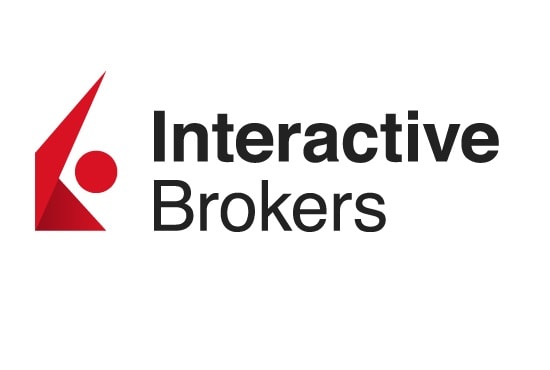| ||
|---|---|---|
Charles Schwab | J.P. Morgan Self-Directed | |
Monthly Fee | Up to 0.80%
$0 online commission on U.S. listed stocks, mutual funds and ETFs, options: $0.65 per-contract, Schwab Intelligent Portfolio – 0%, Schwab Intelligent Portfolios Premium – One-time planning fee: $300 + Monthly advisory fee: $30, Schwab Wealth Advisory: up to 0.80% | $0
$0 online commission on U.S. listed stocks and ETFs and $0.65 per-contract |
Account Types | Brokerage, Retirement, Wealth Management | Brokerage, Retirement, Wealth Management |
Savings APY | 0.05% | 0.01% – 3.99% |
Minimum Deposit | $0 – $500,000
$0 for brokerage account, $5,000 for Schwab Intelligent Portfolios, $25,000 for Schwab Intelligent Portfolios Premium, $500,000 for Schwab Wealth Advisory | $0 |
Best For | Active Traders, Retirement, Robo Advisor | Existing Chase Customers, Active Investors Looking To Minimize Fees |
Read Review | Read Review |
Schwab vs. J.P. Morgan : Compare Features
Schwab offers a more comprehensive suite of services, including robust cash management options and an advanced trading platform with powerful analytical tools.
J.P. Morgan Self-Directed | Schwab | |
|---|---|---|
Investing Options | 800 stocks and ETFs, 8,000+ mutual funds | Full Access To Almost Any Asset |
Investing Types | Stocks, Options, ETFs, Fixed Income, Mutual Funds | Stocks, Options, Futures, ETFs, Bonds & Fixed Income, Forex,Mutual Funds, Money Market Funds |
Automated Investing | No | Yes |
Paper Trading | No | Yes |
IPO Access | No | Yes |
Dedicated Advisor | No | Yes |
Tax Loss Harvesting | No | Yes |
JPM Self-Directed Investing shines in its seamless integration with Chase banking and commission-free trading for a wide range of assets, including fractional shares with more flexible trading approach.
However, it lacks automated investing options and has a lower sweep account rate.
-
Self Investing And Fundamental Analysis Options
Schwab is our winner in self-investing due to its large variety of assets and unique features for investors.
When it comes to fundamental analysis, Schwab excels with its research tools, offering insights from the Schwab team alongside expert commentary.

Investors can access real-time alerts, stock screeners, and extensive educational resources to enhance their trading strategies.

They can also buy fractional shares ( also called “Schwab Slices”), accumulate trading experience with Schwab Paper Money, and get access to IPOs.

On the other hand, JPM Self-Directed Investing provides a diverse selection of stocks, ETFs, mutual funds, and options, and includes fractional shares, making it accessible for investors at various levels.

-
Trading Options And Technical Analysis Tools
The thinkorswim trading app makes Schwab the leader in this category.
The Schwab Thinkorswim platform which is tailored for active traders looking for comprehensive trading options and advanced analytical tools.
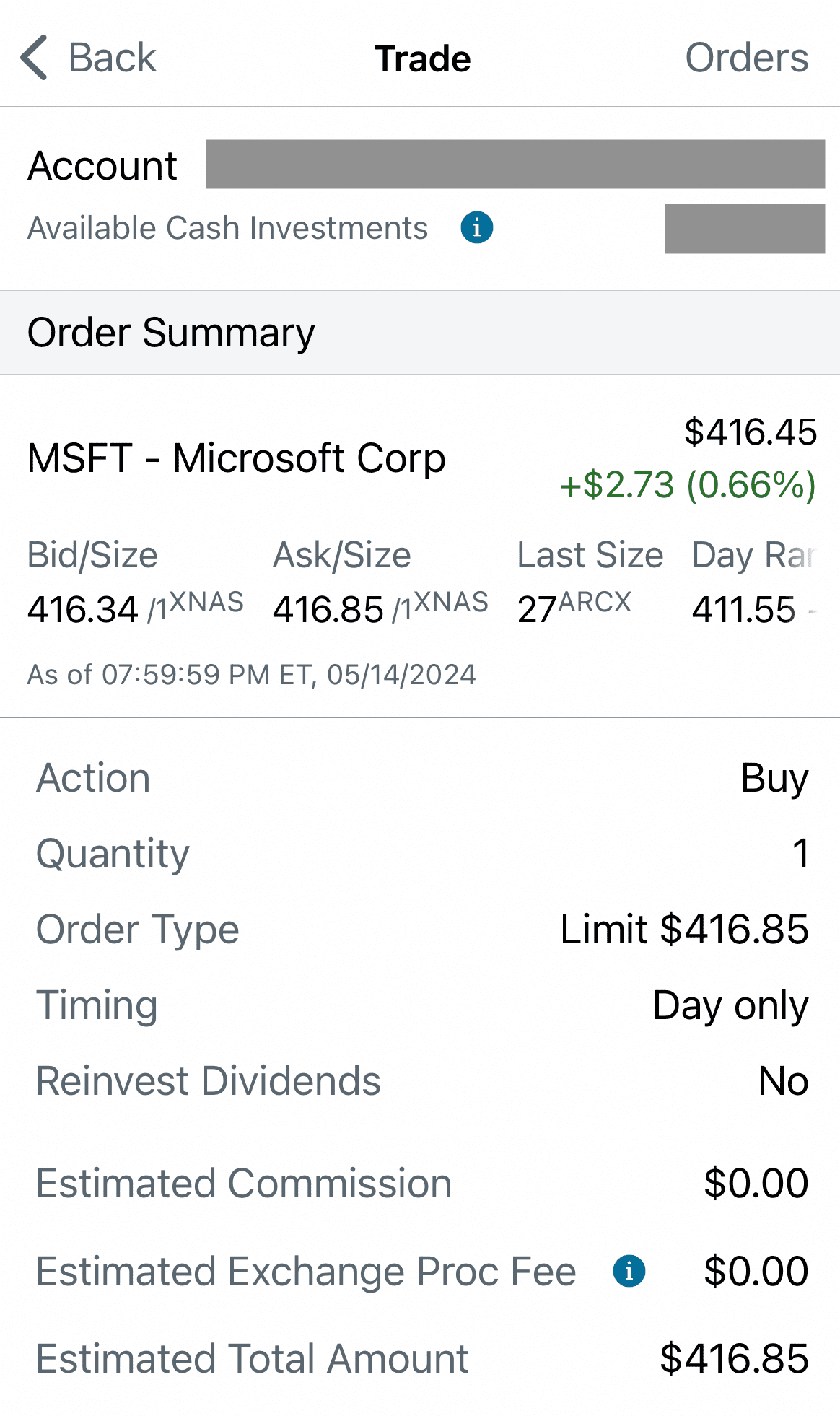
Schwab also provides access to real-time market data and sophisticated trading tools that help users analyze stocks, options, futures, and forex.
Thinkorswim includes robust charting capabilities, allowing users to create custom charts with a wide range of technical indicators drawing tools, and studies. This makes Schwab a better fit for active traders who seek sophisticated market insights.

While JPM’s technical analysis tools aren’t on par with Thinkorswim, offers a broader range of trading options and a slightly more advanced trading platform.

Traders can pick up hundreds of parameters to compare – including momentum, trend and vcolume analysis. Also, there are upper and lower indicators traders can use to suppor their decisions.
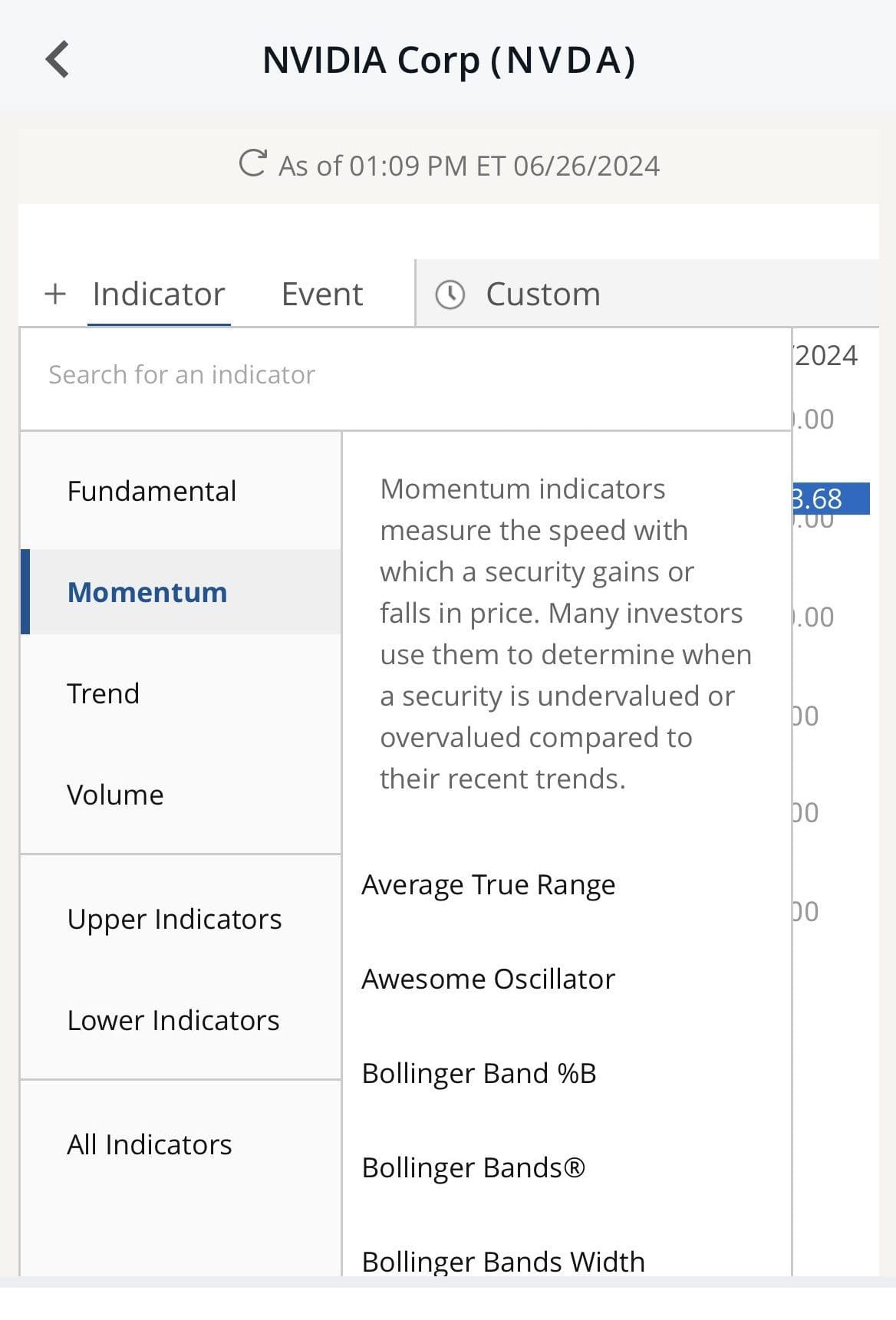
-
Robo Advisor And Automated Investing
Schwab is the winner when it comes to robo advisor, as JOM doesn't even offer one.
Schwab’s Intelligent Portfolios offers a more flexible robo-advisory experience with no management fees and 80+ different variations, mainly low cost ETFs.

It requires a higher minimum investment of $5,000 but includes 24/7 access to live support, and provides features like automatic rebalancing and tax-loss harvesting, enhancing overall portfolio management.
-
Retirement Accounts
Schwab is our winner here due to its variety of retirement accounts, while JPM Self-Directed Investing focuses on simplicity by offering only traditional and Roth IRAs.
While the range is not as extensive as Schwab’s, JPM makes up for it with an easy-to-use platform and the ability to trade a variety of assets, including stocks, ETFs, mutual funds, and options, without commission fees.
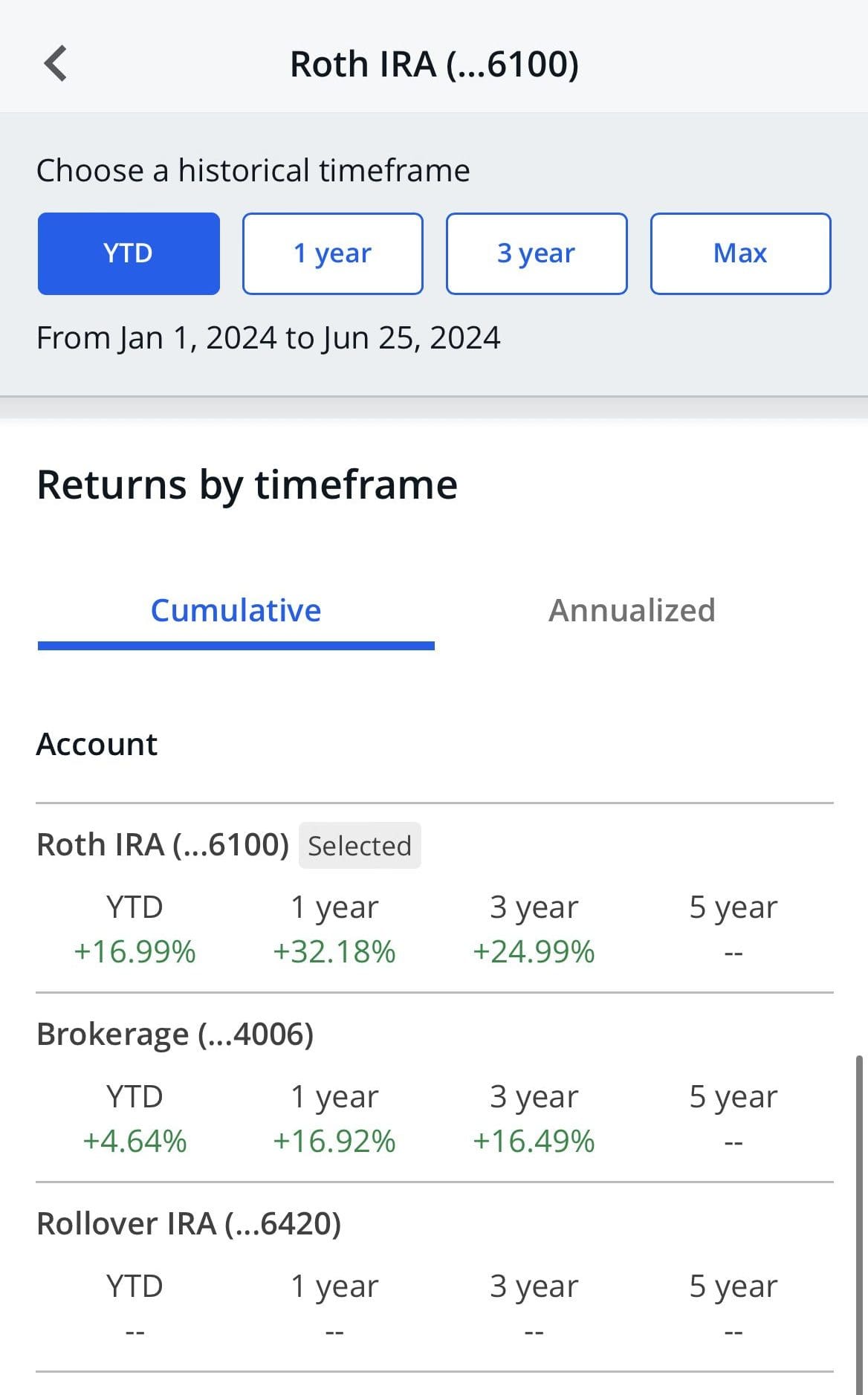
Schwab, on the other hand, provides a more diverse range of retirement accounts, including traditional, Roth, rollover, SEP, and Simple IRAs. This variety is appealing for small business owners and those who want flexible options tailored to their specific needs.
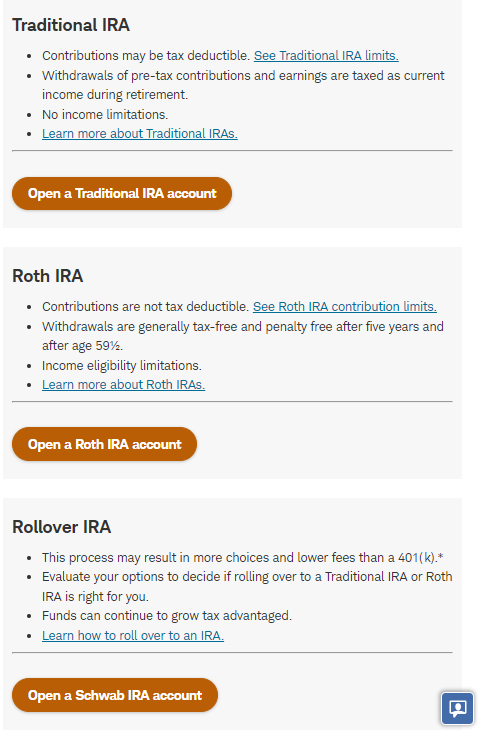
There is an option for Schwab Personal Choice, which is a self directed retirement brokerage account.
-
Fees
When it comes to fees, both platforms offer similar conditions.
JPM and Schwab both offer commission-free trading for U.S. stocks, ETFs, and mutual funds, with options trading at $0.65 per contract.
Schwab | JPM Self-Directed Investing | |
|---|---|---|
Fees | Up to 0.80%
$0 online commission on U.S. listed stocks, mutual funds and ETFs, options: $0.65 per-contract, Schwab Intelligent Portfolio – 0%, Schwab Intelligent Portfolios Premium – One-time planning fee: $300 + Monthly advisory fee: $30, Schwab Wealth Advisory: up to 0.80% | $0
$0 online commission on U.S. listed stocks and ETFs and $0.65 per-contract |
Also, Schwab Intelligent Portfolios has no fee unless you need to consult with an advisor.
-
Cash Management And Savings Rates
Unless you're a Chase customer, Schwab is our winner if you are looking for cash management.
Schwab | JPM Self-Directed Cash APY | |
|---|---|---|
Savings APY | 0.05% | 0.01% – 3.99% |
Schwab excels in providing a comprehensive cash management experience. Its Schwab Bank Investor Checking account comes with no monthly fees, unlimited ATM fee rebates worldwide, and no foreign transaction fees.

Schwab also offers features like bill pay, mobile check deposit, and real-time transaction alerts enhance usability and security.

JPM Self-Directed Investing, on the other hand, shines when it comes to seamless integration with Chase banking services. However, both Schwab and JPM offer low rates for uninvested cash.
If you’re an existing Chase customer, you can easily link your accounts, making it convenient to move money between your bank accounts and your investment portfolio.
-
Wealth Management Options
JPM is our winner when it comes to wealth management.
JPMorgan Wealth Management, on the other hand, offers a more tailored and comprehensive service. While it also targets high-net-worth individuals, JPM excels in providing highly personalized, face-to-face advisory services.
Clients have access to a broad range of investment options, including private banking services, and sophisticated strategies like hedge funds and private equity.

Schwab’s Wealth Advisory service provides personalized investment strategies developed by certified financial planners, focusing on long-term goals and tailored portfolio management.
For those with more substantial portfolios, Schwab Private Client Services and Schwab Private Wealth Services provides dedicated access to a financial advisor, enabling customized advice and planning tailored to individual financial situations.
Bottom Line
Overall, Schwab surpasses JPM self-directed in most categories, including self-directed investing, robo advisory, and technical analysis, making it the ultimate choice.
If you're a beginner or need wealth management, consider using JPM.
How Schwab Compares to Other Online Brokers
Schwab offers more options for investors, including robo advisors and wealth management, while Robinhood is best for beginners and traders.
Both Schwab and Fidelity offer great options for traders, plans for wealth management, and sophisticated auto-investing platforms.
Schwab provides broader tools and analysis options for long-term, value investors, while Interactive Brokers is more suited to active traders.
Schwab vs. Interactive Brokers: Which Brokerage is Right for You?
Schwab is our pick for long-term investors, wealth management, or retirement. E-Trade may be better for traders and cash management.
While Vanguard appeals to buy-and-hold investors, Schwab’s platform is designed for those who want to engage actively with the market.
Schwab is our winner for investors and traders. However, the differences between brokerages are not significant. Here's our comparison:
How J.P. Morgan Self Directed Compares to Other Online Brokers
Both offer similar tools for the average investor or trader, but Merrill is better at automated investing. Here's our full comparison:
J.P. Morgan Self-Directed Investing vs. Merrill Edge: Compare Brokerage Accounts
If you're an experienced investor or trader, IBKR may be a better option. If you're a Chase customer or prefer simplicity, consider JP Morgan.
Interactive Brokers vs. J.P. Morgan Self-Directed Investing: Which Broker Wins?
Vanguard offers a better approach for serious investors, while JP Morgan's self-directed is better for beginners and advanced traders
Vanguard vs. J.P. Morgan Self-Directed: Which Broker is Best For You?
JP Morgan is best for the average investor seeking a simple platform or wealth management, but E-Trade is our overall winner. Here's why.
J.P. Morgan Self-Directed Investing vs. E-Trade: Which Broker Wins?
Fidelity is our winner due to its investment options, research tools, advanced trading features, and excellent retirement planning services.
J.P. Morgan Self-Directed Investing vs. Fidelity : A Side-by-Side Comparison
JP Morgan wins when it comes to fundamental investing tools, but Robinhood is better for technical analysis and trading. Here's why:
J.P. Morgan Self-Directed Investing vs. Robinhood: Compare Brokerage Accounts



